| 1. The Growth of Biofuels in the 21st Century: Policy Drivers and Market Challenges / Robert Ackrill and Adrian Kay. New York: Palgrave Macmillan, 2014 |
 |
Abstract: This book provides a timely and insightful analysis of the expansion of bio fuels production and use in recent years. Drawing on interviews with key policy insiders, Ackrill and Kay show how bio fuels policies have been motivated by concerns over climate change, energy security and rural development. |
|
2. A history of international thought: from the origins of the modern state to academic international relations / Lucian M. Ashworth. London: Routledge, 2014
|
 |
Abstract: International thought is the product of major political changes over the last few centuries, especially the development of the modern state and the industrialization of the world economy. While the question of how to deal with strangers from other communities has been a constant throughout human history, it is only in recent centuries that the question of ‘foreign relations’ (and especially imperialism and war) have become a matter of urgency for all sectors of society throughout the world. This book provides the first comprehensive overview of the evolution of Western international thought, and charts how this evolved into the predominantly Anglophone field of International Relations. |
| 3. A history of modern tunisia / Kenneth Perkins. New York: Cambridge University Press, 2014 |
 |
Abstract: Kenneth Perkins's second edition of A History of Modern Tunisia, updated with a new chapter, carries the history of this country from 2004 to the present, with particular emphasis on the Tunisian revolution of 2011 - the first critical event of that year's Arab Spring and the inspiration for similar populist movements across the Arab world. After providing an overview of the country in the years preceding the inauguration of a French protectorate in 1881, the book examines the impact of colonialism on the country, with particular attention to the evolution of a nationalist movement that secured the termination of the protectorate in 1956.
|
| 4. Hot spots: American foreign policy in post-human-rights world / Amitai Etzioni London: Transaction Publishers, 2015 |
 |
Abstract: There are important reasons for the distinct yet significant course adjustments in American and Western foreign policy, which is currently focused on the Middle Eastern and Chinese "hot spots." In early 2012, the United States "pivoted" to make the Far East its military and strategic first priority, thereby downgrading the Middle East. This change in priorities has been accompanied by a curtailed military budget and the end of the two-war doctrine. Amitai Etzioni argues that pivoting towards the Far East is premature and flawed in principle. China can and should be treated for the near future as a potential partner in a changing global order, rather than contained and made into an enemy. At the same time, he argues, the true hot spots continue to be in the Middle East, albeit not in Iraq or Afghanistan, but in Iran and Pakistan. |
| 5. Human Security and Sierra Leone's Post- Conflict Development/ Francis Wiafe-Amoako. UK: Lexington Books, 2014 |
 |
Abstract: Achieving security and development in the post-conflict era is a challenge with which stakeholders have to grapple. While stakeholders are quick to claim success when physical hostilities cease between the belligerents, ensuring sustainable peace has been a daunting task. In some countries in Africa, the post-conflict era is characterized by organizing elections to ensure greater political participation. It is believed that elections will begin a process of openness and trust in the governing system. A supplement to electoral democracy has been power sharing arrangements used to resolve post-election violence, and ensure stability within the state. |
| 6. Improving Global Environmental Governance: Best Practices for Architecture and Agency / Edited by Norichika Kanie, Steinar Andresen,Peter M. Haas.New York: Routledge, 2015 |
 |
Abstract: The experience of environmental governance is approached in Improving Global Environmental Governance from the unique perspective of actor configuration and embedded networks of actors, which are areas of emerging importance. The chapters look at existing Multilateral Environmental Agreements (MEAs) and the broader constellation of partially networked institutions to better understand the involvement of individual actors and how to deepen the networks that include them to generate more effective governance. |
| 7. In Security and the Production of International Relations: The Politics of Securitization in Europe / Jonas Hagmann. New York: Routledge, 2014 |
 |
Abstract: This book provides a framework for analysing the interplay between securitization and foreign affairs, reconnecting critical security studies with traditional IR concerns about interstate relations. What happens to foreign policymaking when actors, things or processes are presented as threats? This book explains state behavior on the basis of a reflexive framework of insecurity politics, and argues that governments act on the knowledge of international danger available in their societies, but that such knowledge is organized by markedly varying ideas of who threatens whom and how.
|
| 8. India's Security: Issues and challenges/ Edited by: Hari Saran, Vinod Kumar Singh. New Delhi: Mohit Publications, 2014 |
 |
Abstract India was partitioned in the backdrop of large-scale communal riots,but the partition of the country on religious lines, without taking into consideration its multiple identities, instead of bringing the communal tensions down, in fact, worsened the situation. The two-nation theory created Pakistan, and it still survives on this theory. Pakistan finds it difficult to accept the reality that India continues to be a democratic, plural, multireligious society and that India today has more Muslim citizens than Pakistan. The Government of Pakistan has taken upon itself the responsibility of not only protecting its own citizens, but also the Indian Muslims |
| 9. India and Central Asia: exploring new horizons for cooperation / Edited By: Rajiv K. Bhatia, Meruyert Abusseitova and others. Delhi: Shipra, 2014 |
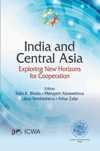 |
Abstract: Kazakhstan, Kyrgyz Republic, Tajikistan, Turkmenistan and Uzbekistan, the five Central Asian republics in India’s extended neighbourhood, have achieved significant political, economic and cultural development since their independence in early 1990s. Rich historical past, availability of huge energy resources, more than two decades of relative peace, gradual opening of economies and centrality of the region in inter and intra-continental transportation and communication links have made Central Asia an area of great interest for scholars, businesses, travellers as well as regional and extra-regional countries. |
| 10. India and SriLanka: future imperfect / Edited By: Shrikant Paranjpe Rajendra Abhyankar. Delhi: G.B Books, 2014 |
 |
Abstract: The book on India Sri Lanka relations which are the proceedings of a Conference held by the Kunzru Centre for Defence Studies and Research, Pune on 25 March 2013 is just out. We received generous help from the Indian Council of World Affairs, New Delhi. We had the presence of the High Commissioner of Sri Lanka to India and Mr Varthraja Perumal the former Chief Minister of the former North East Provincial Council in Sri Lanka and many academics and senior Indian Army officers who were part of the Indian Peace keeping force in Srl Lanka |
| 11. India's rise as an Asian power: nation, neighborhood, and region / Sands Gordon Washington: Foundation Books, 2014 |
 |
Abstract: India's Rise as an Asian Power examines India's rise to power and the obstacles it faces in the context of domestic governance and security, relationships and security issues with its South Asian neighbors, and international relations in the wider Asian region. Instead of a straight-line projection based on traditional measures of power such as population size, economic growth rates, and military spending, Sandy Gordon's nuanced view of India's rise focuses on the need of any rising power to develop the means to deal with challenges in its domestic, neighborhood (South Asia), and regional (continental) spheres. |
| 12. India's Security: policy, perspective and problems / V.K. Nayyar Delhi: Sumit Enterprises, 2014 |
 |
Abstract: I deem it a privilege to be invited to deliver the IDSA Foundation Lecture. Since inception in November 1965, under the stewardship of the late Shri Y B Chavan and the subsequent direction provided by Shri K Subrahmanyam, former Director, the IDSA has acquired a creditable profile. Over the years, the IDSA has played a commendable role in enriching the security discourse and deliberations in India. It is in this context that I propose to share my thoughts with you on a matter of concern to all of us, namely, “India’s Internal Security Challenges”. |
| 13. India's Tibet policy and China / M.N. Sarin. -- 2015 Delhi: Gaurav Books Centre |
 |
Abstract: This book is incisive analysis of situations leading to complete hold of Tibet by china during the last over 50 years. The main reasons why China India geo political relations have an underlying uneasiness is because of the issue of Tibet. |
| 14. India, US and the Nuclear Deal: A Critical Study / Mohammed Badrul Alam, Muzaffar Ahemad Ganaie. New Delhi: Ess Ess Publications, 2015 |
 |
Abstract: Among the important benchmarks of India-US bilateral relationship, the landmark initiative was the India-US Civil Nuclear Cooperation Deal. The framework of this initiative was established on 18 July 2005 when President George W. Bush and Indian Prime Minister Dr. Manmohan Singh issued a Joint communique. In the joint communique, President Bush termed India as a "responsible state with advanced nuclear technology" and stated that it "should acquire same benefits and advantages as other such states." Bush also assured Prime Minister Dr. Manmohan Singh that "he will work to achieve full civil nuclear energy cooperation with India as it realizes its goals of energy security." |
| 15. Indian foreign policy: ambition and Transition / Chris Ogden. UK: Polity, 2014 |
 |
Abstract: India is becoming an increasingly visible, powerful and influential state within the global system. As this rise to prominence continues, better appreciating the interests and principles that structure the international interactions of South Asia's largest state has never been so important. Keen to embrace an expectant future as a great power, India's transitional journey has been characterised by astounding diplomatic achievements and significant strategic failures. In this robust and comprehensive analysis, Chris Ogden introduces students to the key dimensions of Indian foreign policy from her emergence as a modern state in 1947 to the present day. |
| 16. Indian Foreign Policy in Transition: Relations with South Asia / Arijit Mazumdar. New York: Routledge, 2014 |
 |
Abstract: India’s relation with other South Asian countries has been impacted by recent developments in the post-Cold War period. These include India’s economic rise, the recent democratic transitions in many South Asian countries and greater US engagement in the region following 9/11. This book is an effort to address these issues and examine their role in India’s interactions with its neighbours. Indian Foreign Policy in Transition provides a comprehensive overview of India’s relations with the South Asian countries of Pakistan, Afghanistan, Bangladesh, Sri Lanka and Nepal, Bhutan and the Maldives. |
| 17. Indian transnationalism online: new perspectives on diaspora / Edited by Ajaya Kumar Sahoo and Johannes G. de Kruijf. England: Ashgate, 2014 |
 |
Abstract: Present-day migration takes place in a world characterized by the compression of time and space, with cheaper air travel and the existence of new communication technologies - the internet in particular - making it easier to stay in contact with the places, people and cultures that one has left. This book investigates the online organization of, and exchanges within, the global Indian diaspora. Bringing together research from around the world and presenting studies drawn from the US, Europe and India, it engages with theoretical and methodological debates concerning the shaping and transformation of migrant culture in emerging sites of sociality, and explores issues such as religion, citizenship, nationalism, region and caste as they relate to Indian identity in global, transnational contexts |
| 18. Insurgency and counterinsurgency in South Asia / Ed by Moeed Yusuf. Washington: United Institute of peace, 2014 |
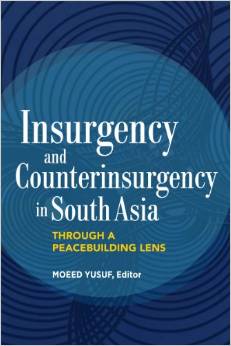 |
Abstract: Insurgency and Counterinsurgency in South Asia underscores the need for South Asian decision makers and relevant actors around the world to systematically examine the nature of intrastate insurgent movements. Using the "conflict curve" theory of conflict evolution, ten experts native to South Asia consider the trajectories of four of the most salient armed insurgencies in a region that has experienced many such sustained conflicts and the counterinsurgent response to each. Case studies on India, Pakistan, Nepal, and Sri Lanka lend important lessons on the dynamics of each conflict while collectively offering insights into how and why insurgencies occur and transform as well as how they can be prevented or resolved. |
| 19. Internal security and state building: aligning agencies and functions / B.K. Greener and W.J. Fish London: Routledge, 2015 |
 |
Abstract: This book examines international efforts to provide security in post-conflict sites and explains why internal security should be given precedence in statebuilding endeavours. The work begins by exploring the evolution of security sectors in mature liberal democratic states, before examining the attempts of such states to accelerate that evolutionary process in post-conflict sites through state building and security sector reform. These discussions suggest interestingly different answers to the question of who should provide for internal security in international operations. When considering mature states, there are both practical and normative reasons as to why internal security has become the sole domain of police, with military forces being excluded from internal affairs. |
| 20. International Climate Change Law and State Compliance / Alexander Zahar. New York: Routledge, 2015 |
 |
Abstract: International Climate Change Law and State Compliance is an unprecedented treatment of the nature of climate change law and the compliance of states with that law. The book argues that the international climate change regime, in the twenty or so years it has been in existence, has developed certain normative rules of law, binding on states. State conduct under these rules is characterized by generally high compliance in areas where equity is not a major concern. There is, by contrast, low compliance in matters requiring a burden-sharing agreement among states to reduce global greenhouse gas emissions to a ‘safe’ level. The book argues that the substantive climate law presently in place must be further developed, through normative rules that bind states individually to top-down mitigation commitments. |
| 21. International Intervention in Ethnic Conflict: A Comparison of the European Union and the United Nations / Etain Tannam. New York: Palgrave Macmillan, 2014 |
 |
Abstract: The EU and the UN have become increasingly involved in conflict resolution, yet they are rarely compared systematically. This book focuses on the role of bureaucracies in the European Union (EU) and the United Nations (UN) when dealing with conflict. Tannam's comparative analysis of EU and UN policy-making procedures explores how and why they differ from each other, arguing that the UN Secretariat and the European Commission have autonomy under certain conditions and that reducing explanations of EU and UN policy outcomes to political will, or to the preferences of member states is inaccurate. |
| 22. International law, new diplomacy and counterterrorism: an interdisciplinary Study of legitimacy / Steven J. Barela London: Routledge, 2014 |
 |
Abstract: This interdisciplinary book explores how terrorism is meant to target government’s legitimacy, and advocates for sounder defensive measures when countering international attacks. The dramatic increase in global cooperation throughout the twentieth century between international organisations and their state missions of diplomats, foreign officers, international civil servants, intelligence officers, military personnel, police investigators, judges, legislators, and financial regulators—has had a bearing on the shape and content of the domestic political order. |
| 23. International mediation bias and peacemaking: taking sides in civil wars / Isak Svensson. London: Routledge, 2015 |
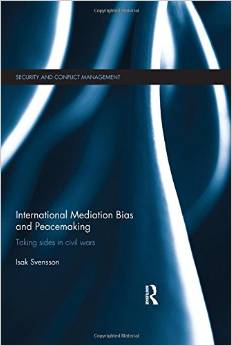 |
Abstract: This book examines the effect of biased and neutral mediators in civil wars. Based on analysis of both global data and case studies of contemporary peace processes, including India and Norway in Sri Lanka, China in Cambodia, US in Israel/Palestine, and Russia in Georgia, the book makes two main contributions. First, it explores the role of biased mediators in contemporary peace processes. The author develops a theory explaining why biased mediators are more effective than their neutral counterparts and the book identifies four different mechanisms through which biased mediators can be effective peace-brokers. By developing a comprehensive set of mechanisms to explain bias mediation, the work deepens understanding of biased mediators in general, and their role in resolving civil conflict in particular. |
| 24. International Relations of China/ Edited by Shaun Breslin, Carla Freeman, Simon Shen. Washington: Sage, 2015 |
 |
Abstract: To say that the rise of China has captured the popular attention is something of an understatement. Hardly a day goes by without the publication of a new study that confidently predicts China’s future - be that a focus on internal challenges and potential collapse, or China’s rise to inevitable global dominance. The aim of this eight-volume collection is to provide, in a single resource, an overarching view of the totality of China’s place in the world. |
| 25. International Rule of Law and Professional Ethics / Edited by Vesselin Popovski UK: Ashgate, 2014 |
 |
Abstract: This book examines an interesting and relatively understudied area of the evolution of the international rule of law and the role of professional ethics. The rule of law has been gradually developed and promoted at the national level over centuries, however at the international level it has only recently received (more in rhetoric than in implementation) support from a macro perspective - developments of international rules and institutions, and from a micro perspective - ethical codes, independence and un-bias of professionals, working in international organizations and tribunals. The book offers analysis and recommends policies to strengthen the rule of law at international level to meet a major global governance demand in ensuring equity, justice, stability and consistency in international affairs. |
| 26. Interpreting China as a regional and global power: nationalism and historical conciousness in world politics / Bart Dessein Ed. New York: Palgrave Macmillan, 2014 |
 |
Abstract: Until the 19th century, Confucian China was arguably the most important economic and political power in East and Southeast Asia. The fall of the Confucian empire in the early 20th century paved the way for the development of Chinese nationalism which was seen as the only means by which the country could regain its importance as a regional and global power. The changing position of contemporary China in the world and the revaluation of Confucianism combined with nationalist and patriotic tendencies bring into question the role that historical consciousness plays in China's national and international identity. This important collection discusses the history of Chinese nationalism and the issue of traditionalism vs. |
| 27. The invention of the land of Israel: from holy land to homeland / Shlomo Sand London: Verso, 2014 |
 |
Abstract: The Invention of the Land of Israel deconstructs the age-old legends surrounding the Holy Land and the prejudices that continue to suffocate it. Sand’s account dissects the concept of “historical right” and tracks the creation of the modern concept of the “Land of Israel” by nineteenth-century Evangelical Protestants and Jewish Zionists. This invention, he argues, not only facilitated the colonization of the Middle East and the establishment of the State of Israel; it is also threatening the existence of the Jewish state today. |
| 28. Iranian foreign policy during ahmadinejad: ideology and actions / Maaike Warnaar.UK: Palgrave Macmillan, 2013 |
 |
Abstract: Written for scholars and practitioners puzzled by Iran's foreign policy choices, this book gives an account of Iranian foreign policy ideology and behavior during the time of Mahmoud Ahmadinejad's two terms as Iran's president (2005-2013). It shows how the regime's discourse of change allowed for an assertive foreign policy that combined defiance to Western pressure with the search for other international partners. Acting on the premise that US hegemony is coming to an end, the Iranian regime tried to contribute to the creation of an alternative, multipolar system in which rising powers gain ascendance. Foreign policy actions were in line with this discourse, and they confirmed the regime's identification of Iran as an example to other nations in a changing world. |
| 29. Iraqi federalism and the kurds: learning to live together / Alex Danilovich. England: Ashgate, 2014 |
 |
Abstract: Iraqi Federalism and the Kurds: Learning to Live Together addresses these important questions and focuses on the role of federalism as a viable solution to Iraq's many problems and the efforts the Kurdish government has deployed to adjust to new federal relations that entail not only gains, but also concessions and compromises. The author's direct experience of living and working within this embattled country allows a unique reflection on the successes and failures of federalism and the positive developments the introduction of federal relationships have brought. |
| 30. The Islamic Republic of Iran: reflections on an emerging economy/ Jahangir Amuzegar. New York: Routledge, 2014 |
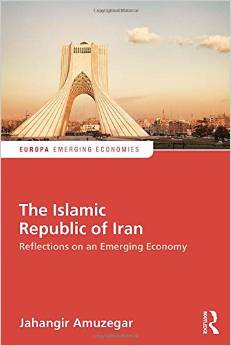 |
Abstract: This title provides an in depth study of Iran’s post 1979 Revolution economy under the Islamic Republic, with new material and related journal articles combined under one roof in a novel and reader friendly style. The volume starts with an original text, summarizing the development of the Iranian economy under five successive administrations, in five distinct phases. Following this are fifteen accompanying articles providing detailed information that expands on, and compliments, the discussion in the original material. Appropriate references on specific topics are made to each relevant article, ensuring the material is easily accessible to the reader. |
| 31. The islamic state in the post-modern World: political experience of Pakistan/ Louis D. Hayes.USA: Ashgate, 2014 |
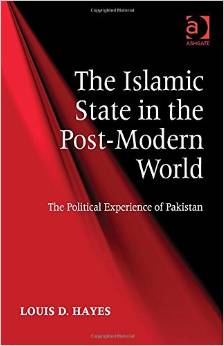 |
Abstract: The Islamic State in the Post-Modern World is a study of the political development of Pakistan. This study consists of three parts. The first addresses the concept of the 'state' as it has evolved historically. The approach is comparative and involves a brief review of Islamic political theory. The second part of this section is the modern state, i.e., the West phalian model. The territorial state is still the standard although it has been evolving in new directions for some time. |
| 32. Israel and the world powers: diplomatic Aaliances and international relations beyond the middle East / Colin Shindler E London: I. B. Tauris, 2014 |
 |
Abstract: Israel's relations - or lack of them - with Muslim countries throughout the Middle East and the Islamic world are subject to repeated analysis and scrutiny in both the media and academia. But what have previously been less examined are Israel's relationships with the rest of world: from the former colonial states of Britain and France to the superpowers of the US and Russia and to emerging and regional powers such as China, India and Brazil. Conventionally seen as a state isolated from its Arab neighbors and irrevocably allied with the US, Israel is examined here in the light of its efforts to strengthen diplomatic ties with other powers, such as its attempts to improve fractious relationship with post-World War II Germany and the EU. |
| 33. The Koreas between China and Japan / Ed by Lee Guen and Victor Teo. UK: Cambridge Scholars Publishing, 2014 |
 |
Abstract: In the first volume of its kind, this collection of essays presents the challenges faced by the Koreas against the context of the changing relations between China and Japan. Strategically nestled between these political giants, the Korean Peninsula has traditionally been "seen" as a sphere of influence by Tokyo and Beijing. Regardless of the escalating difficulties in recent Sino-Japanese relations, this volume argues that avoiding all-out conflict and ensuring a nuclear-free Korean Peninsula are certainly strategic goals that both China and Japan still share. Neither China nor Japan wishes to be dragged into a war started by North Korean belligerence, South Korean aspirations or American adventurism. However, despite alternating between political pressure and diplomatic efforts, Japan and China have found it extremely difficult to guide the tone and direction of politics in intra-Korea affairs. Conversely, both South and North Korea have been extremely adept at fending off any perceived attempts to influence their domestic and foreign policies. |
| 34. The kurds of Iraq: nationalism and identity in Iraqi Kurdistan / Mahir A. Aziz. London: I.B. Tauris, 2015 |
 |
Abstract: Over ninety years since their absorption into the modern Iraqi state, the Kurdish people of Iraq still remain an apparent anomaly in the modern world a nation without a state. In The Kurds of Iraq, Mahir Aziz explores this incongruity, and asks the pertinent questions, who are the Kurds today? What is their relationship to the Iraqi state? How do they perceive themselves and their prospective political future? And in what way are they crucial for the stability of the Iraqi state? Through extensive field research, examining the complex process of identity formation amongst Kurdish students, Aziz analyzes wider issues of the intersection and interdependency of national, regional, ethnic, tribal and local identities. |
| 35. Libya: history and revolution / Richard A. Lobban and Christopher H. Dalton. Colorado: Praeger, 2014 |
 |
Abstract: After four decades of tyrannical, erratic-and pioneering-changes fueled by oil wealth, Muammar Gaddafi's government fell in 2011, and Libya embarked on a new course without known charts. Libya: History and Revolution covers the nation from its origins as independent land masses and kingdoms to its present as a consolidated nation. The work does not focus on the "old" Libya, but aims to bridge yesterday's Libya with tomorrows, looking at the nation as a regional economic power and military player in North Africa and the Middle East. The result is a comprehensive yet easy-to-understand introduction to the political, economic, and military history and events that led to Gaddafi's downfall, coupled with a consideration of Libya's past and present. |
| 36. The limits of democratic governance in South Africa / Louis A. Picard and Thomas Mogale london: Lynne Rienner Publishers, 2015 |
 |
Abstract: In the transition from apartheid rule to democratic governance in South Africa, what has been the impact on South African society at its base on the people in the country's cities, towns, villages, and farms? Louis Picard and Thomas Mogale offer answers to this fundamental question, tracing historical trends and measuring change (or the lack of it) in the dynamic between the promise of local participatory governance and the realities of a hierarchical state. |
| 37. Macao - The Formation of a Global City / Edited by C.X. George Wei. New York: Rotledge, 2014 |
 |
Abstract: Macao, the former Portuguese colony in southeast China, has a long and very interesting history of cultural interaction between China and the West. Held by the Portuguese from the 1550s until its return to China in 1999, Macao was up to the emergence of Hong Kong in the later nineteenth century the principal point of entry into China for all Westerners Dutch, British and others, as well as Portuguese. The relatively relaxed nature of Portuguese colonial rule, intermarriage, the mixing of Chinese and Western cultures, and the fact that Macao served as a safe haven for many Chinese reformers at odds with the Chinese authorities, including Sun Yat-sen, all combined to make Macao a very different and special place. |
| 38. Maintaining peace and security?: the United Nations in a changing world / Trudy Fraser. London: Palgrave, 2014 |
 |
Abstract: The security concerns of the United Nations today extend far beyond what the writers of the 1945 Charter could have imagined. As a result, the UN has been compelled to reconsider the parameters of what constitutes a threat to international peace and security, and what it means to be safe and secure in the twenty-first century. This text critically assesses the capacity of the UN to evolve in response to changing notions of security, and examines the complex history of people, places and politics that have helped shape this important global actor. |
| 39. Major law and policy issues in the South China sea: European and American perspectives / Yann-huei Song and Keyuan Zou Ed England: Ashgate, 2014 |
 |
Abstract: Major law and policy issues in the South China Sea are discussed mainly from the perspectives of leading American and European scholars in the study of the complex South China Sea disputes. The issues include regional maritime cooperation and regime building, Southeast Asian countries' responses to the Chinese assertiveness, China's historic claims, maritime boundary delimitation and excessive maritime claims, military activities and the law of the sea, freedom of navigation and its impact on the problem, the dispute between Vietnam and China, confidence-building measures and U.S.-Taiwan-China relations in the South China Sea, and Taiwan's role in the resolution to the South China Sea issues. |
| 40. Marine policy: an introduction to governance and international law of the oceans / Mark Zacharias. / Zacharias. London: Routledge, 2014 |
 |
Abstract: It starts with a biophysical overview of the structure and function of the marine environment with a particular emphasis on the challenges and opportunities of managing the marine environment. An overview of the creation and function of international law is then provided with a focus on international marine law. It explores the geographic and jurisdictional dimensions of marine policy, as well the current and anticipated challenges facing marine systems, including climate change-related impacts and resource over-exploitation. The book should appeal to senior undergraduate and graduate students and form a core part of the curriculum for marine affairs, science and policy courses. |
| 41. Maritime power in the black sea / Deborah Sanders. England: Ashgate, 2014 |
 |
Abstract: Maritime Power in the Black Sea provides the first comprehensive assessment and evaluation of the comparative maritime power of the six littoral states in the Black Sea - Turkey, Russia, Ukraine, Georgia, Romania and Bulgaria. This book examines the maritime capabilities and assets of each of the six littoral Black Sea states and also considers the implications of the distribution of maritime power on both regional and international security. As such it makes an important contribution to the debate about what constitutes maritime power in the twenty first century and provides a thematic comparative study of the ability of each of the littoral states of the Black Sea to project maritime power. |
| 42. The merits of regional cooperation: the case of South Asia / Siegfried O. Wolf Ed.Switzerland: Springer, 2014 |
 |
Abstract: This book highlights various cutting-edge topics and approaches to cooperation and regional integration in South Asia. Contributions from both South Asian and EU scholars carry the distinctive flavour of differing perspectives, in order to identify possible driving factors for regional cooperation. The book is divided into four parts: Peace and Stability focuses on how to combat terrorism and ideologies of hate, looks at governance in the context of cultural diversity, and examines the role of education in achieving traditional and human security; |
| 43. A military history of Japan: from the age of the samurai to the 21st century/ John T. Kuehn. California: Praeger, 2014 |
 |
Abstract: The legacy of Japanese warfare is steeped in honor, duty, and valor. Yet, some of the more violent episodes in this country's military history have tainted foreign attitudes toward Japan, oftentimes threatening the economic stability of the Pacific region. This book documents Japan's long and stormy history of war and military action, provides a thorough analysis of the social and political changes that have contributed to the evolution of Japan's foreign policy and security decisions, and reveals the truth behind the common myths and misconceptions of this nation's iconic war symbols and events, including samurais, warlords, and kamikaze attacks. |
| 44. Misunderstanding Russia: Russian foreign policy and the west / Magda Leichtova.USA: Ashgate Publishers, 2014 |
 |
Abstract: Well argued and balanced, Leichtova provides an alternative and more constructive understanding of what drives Russian foreign policy. The book is based on the concepts of constructivism and orientalism in international relations to analyse the policies of the Russian Federation. This book highlights that Russian foreign policy is complex phenomenon constructed from internal as well as external developments, perceptions and expectations.At the same time, it also highlights that Western states are the most significant Other in construction of the Russian foreign policy and even Russian identity and, at the same time, actively create an 'image of Russia' in international politics which is widely based on their own Western assumptions about the country. |
| 45. Music and Diplomacy from the Early Modern Era to the Present / Edited by Rebekah Ahrendt, Mark Ferraguto Damie Mahiet. New York: Palgrave Macmillan, 2014 |
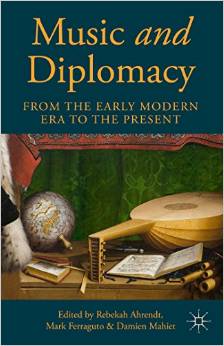 |
Abstract: How does music (its concepts, practices, and institutions) shape the exercise of diplomacy, the pursuit of power, and the conduct of international relations? Drawing together sixteen international scholars with backgrounds in musicology, ethnomusicology, political science, cultural history, French studies, German studies, and communication, this volume interweaves historical, theoretical, and practical perspectives. Considering such issues as what it means for political bodies to act "in concert," the question of music's "universality," the concept of free improvisation as it relates to twenty-first century political policy, the role of orchestras and traveling musicians in promoting cultural exchange, and the use of music as an agent of globalization and transnational encounter, the essays not only cross disciplinary boundaries but also geographical and musical ones. |
| 46. Myanmar: the dynamics of an evolving polity / David I. Steinberg. London: Lynne Rienner Publishers, 2015 |
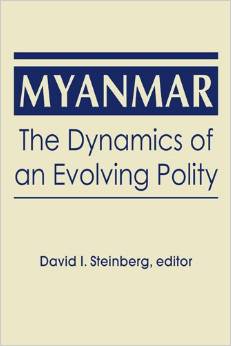 |
Abstract: What issues will Myanmar need to address as it moves beyond the immediate complexities of a transition from an authoritarian state to a more pluralistic polity? How will the new government navigate the challenges some new, some old of increasing public participation, persistent coercive forces, economic transformation, ethnic tensions, varying conceptions of the role of law, and more? The authors of this forward-looking volume offer a careful, timely analysis of the kaleidoscopic array of changes occurring in Myanmar and consider the potential long-term impact of those changes for both the country and the region. |
| 47. NATO's Post-Cold War Politics: The Changing Provision of Security / Edited by Sebastian Mayer. New York: Palgrave Macmillan, 2014 |
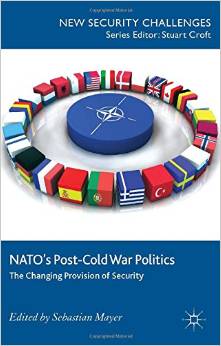 |
Abstract: This collection portrays NATO's post-Cold War bureaucracy, decision-shaping and -making at Brussels Headquarters, identifies changes therein and evaluates their implications for the pursuit of external security with accompanying shifts in the locus of governance. It does so using the analytical concept of 'internationalization' which draws upon neo-institutionalism insights: a process by which national procedures of a policy area are linked with or shift to international organizations and thus enhance their significance. While some chapters centre on NATO's new post-Cold War security environment or changed power structures impacting on Alliance politics, the majority of authors describe NATO's new or adapted administrative bodies, associated operational roles and political procedures, its cooperation with third-party actors, and assess associated levels of internationalization. |
| 48. Networked governance and transatlantic relations: building bridges through science diplomacy / Gabriella Paar-Jakli London: Routledge, 2014 |
 |
Abstract: Gabriella Paar-Jaklis study aims to advance theory and practice by examining the networks used by specialists in North America and Europe to achieve their policy goals in the area of science and technology. Her book suggests that to overcome policy problems transnationally, three critical factors should be considered. First, as science and technology policy becomes increasingly critical to resolving global issues, it should be regarded as an integral element of the foreign policy process. Second, as liberal international relations theory argues, the increasing role of NGOs must be taken seriously alongside states as vital agents of policy reform. Third, as transatlantic relations remain center to maintaining the global order, they must be reconsidered. Paar-Jakli assesses the role of digital networks as facilitators of regional cooperation. Utilizing various techniques of social network analysis, her research indicates an active and structurally discernible network in cyberspace among transatlantic organizations, and demonstrates the role of virtual networks as facilitators of cooperative arrangements in transatlantic relations. |
| 49. A new scramble for Africa?: the rush for energy resources in sub-saharan Africa / Soren Scholvin Ed. England: Ashgate, 2015 |
 |
Abstract: Global energy consumption will increase rapidly in the next decades. The discrepancy between demand and supply is worrisome within the old and new cores of the world-economy. Sub-Saharan further exploited. Whilst the Global North is a traditional player in the sub-Saharan energy sector, new actors from emerging economies - especially China’s state-owned enterprises but also Brazilian, Indian and South African giants - have entered what appears to be a scramble for the largely untapped energy resources of the region. |
| 50. The New US Strategy towards Asia: Adapting to the American Pivot/ William T Tow and Douglas Stuart. New York: Routledge, 2015 |
 |
Abstract: Barack Obama’s "rebalancing" or "pivot" strategy, intended to demonstrate continued US commitment to the Asia-Pacific region in a variety of military, economic, and diplomatic contexts, was launched with much fanfare in 2011. Implicit in the new strategy is both a focus on China - engagement with, and containment of - and a heavy reliance by the United States on its existing friends and allies in the region in order to implement its strategy. This book explores the impact of the new strategy on America’s regional friends and allies. It shows how these governments are working with Washington to advance and protect their distinct national interests, while at the same time avoiding any direct confrontation with China. |